BOURSESSENEGAL – If you’ve ever wondered, “Why is my poop green?” you’re not alone. Many people experience this phenomenon at some point in their lives. While it can be alarming, green stool often has simple explanations. This article will explore the common causes of green poop, potential health implications, and when to seek medical advice. By the end, you’ll have a better understanding of what your body is trying to tell you.
What Does Green Poop Mean?
Overview of Stool Color
Stool color varies widely and can change due to several factors, including diet, medications, and health conditions. Brown is the typical color of healthy stool, resulting from bile and the breakdown of food. However, when poop appears green, it can raise questions about what’s going on inside your body.
The Role of Bile
To understand why your stool might be green, it’s essential to know about bile. Bile is a digestive fluid produced by the liver and stored in the gallbladder. It helps break down fats in your food. Bile starts as a yellow-green fluid and gradually changes color as it moves through the intestines. If food passes through your digestive tract too quickly, bile doesn’t have enough time to change to its usual brown color. This process can lead to green stool.
Common Causes of Green Poop
1. Dietary Choices
Your diet plays a significant role in stool color. Consuming large amounts of green foods, such as leafy vegetables, can result in green poop. Foods rich in chlorophyll, like spinach, kale, and broccoli, contribute to this change. Additionally, foods with green food coloring, such as certain candies or beverages, can also alter your stool color.
Foods to Consider
- Leafy Greens: Spinach, kale, and collard greens.
- Green Vegetables: Peas, green beans, and broccoli.
- Colored Foods: Any food with added green dye.
2. Digestive Disorders
Certain digestive disorders can affect stool color. Conditions that speed up digestion, such as diarrhea, may prevent bile from fully breaking down. This can lead to green stool. Additionally, conditions like celiac disease or irritable bowel syndrome (IBS) may also play a role in changing stool color.
3. Infections
Bacterial infections can disrupt the normal function of your digestive system. If you have a gastrointestinal infection, your body may react by speeding up the digestive process, leading to green poop. Common infections include those caused by Salmonella or Giardia.
4. Medications and Supplements
Some medications and supplements can also change stool color. Iron supplements are known to cause dark green or black stools. Antibiotics may disrupt gut bacteria, leading to changes in stool consistency and color. If you recently started a new medication, it’s worth considering whether it could be influencing your stool color.
5. Bile Duct Obstruction
In rare cases, a blockage in the bile duct can lead to green stool. If bile cannot flow properly into the intestine, it can cause changes in stool color and consistency. This condition may require medical intervention, so it’s essential to consult a healthcare professional if you suspect a blockage.
When to Seek Medical Attention
Signs of Concern
While green poop is often harmless, certain symptoms warrant a visit to your doctor. Pay attention to the following signs:
- Persistent Change: If your stool remains green for more than a few days without dietary changes.
- Severe Abdominal Pain: If you experience significant discomfort along with green stool.
- Diarrhea: If accompanied by dehydration, fever, or blood in the stool.
- Weight Loss: Unexplained weight loss along with changes in stool color can indicate a more serious issue.
Diagnostic Procedures
If you experience concerning symptoms, your doctor may recommend diagnostic tests. These could include stool tests, blood tests, or imaging studies to determine the underlying cause of your symptoms.
Home Remedies and Management
Dietary Adjustments
If you suspect your diet is causing green poop, consider making some adjustments. Monitor your food intake and try eliminating foods known to cause changes in stool color. Gradually reintroduce these foods to see if they influence your stool color.
Stay Hydrated
Hydration is essential for overall digestive health. Drinking plenty of water can help regulate your digestive system and prevent dehydration, especially if you experience diarrhea.
Probiotics
Incorporating probiotics into your diet can help restore the balance of gut bacteria. Foods like yogurt, kefir, and fermented vegetables can support digestive health. Probiotic supplements are also available and may be beneficial, especially after taking antibiotics.
Conclusion: Understanding Your Body’s Signals
If you ever find yourself asking, “Why is my poop green?” remember that it can often be attributed to diet or a minor digestive issue. While green stool can be alarming, it usually doesn’t indicate a serious problem. By understanding the common causes and recognizing when to seek medical help, you can take charge of your digestive health.
If you experience persistent changes or concerning symptoms, don’t hesitate to reach out to a healthcare professional. Your body communicates in various ways, and paying attention to these signals is key to maintaining good health.
In summary, being informed about the reasons behind changes in stool color can empower you to make better choices for your digestive health. Embrace the knowledge you’ve gained and take steps to support your body’s needs.
This guide provides a thorough overview of green poop while engaging the reader effectively. If you have any specific requests or need further adjustments, feel free to let me know!
REFERENCE : https://www.health.com/



